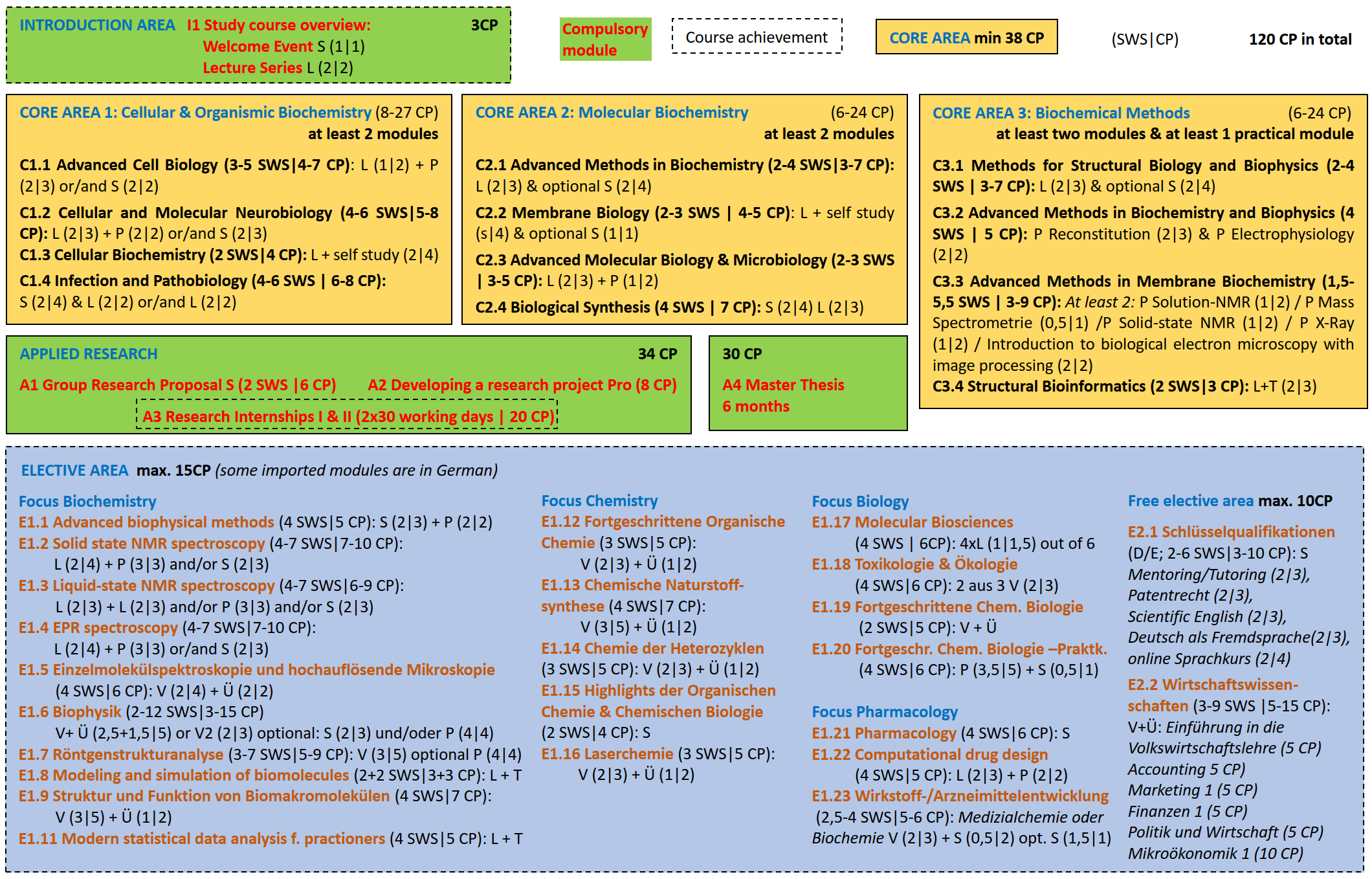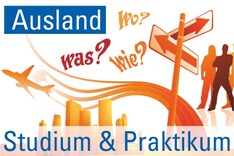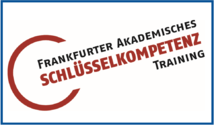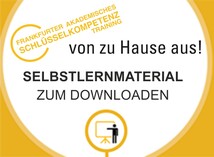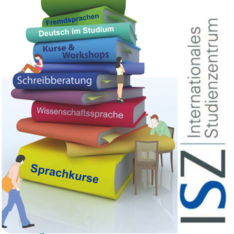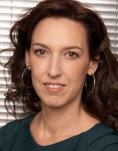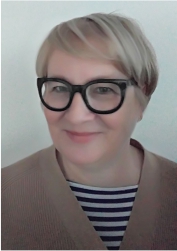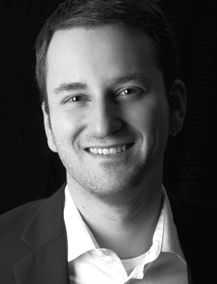NEW Course structure PO2024
Important note
The Master's degree program in Biochemistry PO2024 is currently in the official approval process.
The approval of the Senate and the Executive Board of Goethe University will take place in June 2024.
Until then, all information on the Master's program and the examination regulations (PO2024) are provisional.
The NEW MSc Biochemistry
A central concept of the revised course is flexibility: our students should be given more options to adapt their MSc studies independently to their specific interests and career aspirations. Accordingly, they can selectively choose the courses that really interest them from the modules on offer.
The study plan gives you an initial overview of the entire Master's program in Biochemistry and the associated modules.
The 2-year program is divided into:
Introductory area (I1 | 3 CP)
- a two-day Study Course Overview at the beginning of the first semester is intended to facilitate a smooth start - especially for students from other universities. All relevant information about the study program, the elective options and the information resources of the University Frankfurt (e.g. QIS, OLAT) will be presented.
- additional information about the work and teaching areas of the lecturers is provided in the new seminar Introducing the Research Groups, in which a different lecturer presents their work each week
Core areas (C1/C2/C3 | at least 38 CP)
The biggest innovation is the introduction of core areas from which students can 'freely' choose their modules from defined selction:
[detailed description follows]
- C1 - Cellular & Organismic Biochemistry (8-27 CP)
- C2 - Molecular Biochemistry (6-24 CP)
- C3 - Biochemical Methods (6-24 CP)
Important: at least 2 modules must be chosen from each core area; in the Biochemical Methods core area C3, this must include at least 1 practical module.
In order to create additional options, there are now also modules in which not all courses have to be taken, but in addition to the compulsory lecture, in-depth practicals and seminars can be attended as an option.
New modules:
- Advanced Molecular Biology & Microbiology (C2.3)
- the modules Cellular and Molecular Neurobiology (C1.2), Infection and Pathobiology (C1.4), Membrane Biology (C2.2) and Biological Synthesis (C2.4), which were previously among the most frequently chosen elective modules, have been integrated into the core areas and additionally increase the elective options there
Applied research (A1/A2/A3 | 34 CP)
Modules that we consider to be particularly relevant for practice-oriented training remain compulsory modules:
- A1 Group research proposal (development of a research project in group work, 6 CP)
- A2 Developing a research project (independent development of a research project, 8 CP)
- A3 Research internships I & II (research internships, 2x10 CP)
Master thesis (A4 | 30 CP)
Over a period of 6 months, students work independently on a question relating to current biochemical research.
Elective Area (E | max. 15CP)
A wide range of elective options from the fields of biochemistry, chemistry, biology, pharmacology or the free area (max. 10CP) such as key qualifications and economics and every other module offered by goethe university.
The master program has a modular structure and is divided into compulsory modules (I1, A1-A4) and compulsory elective modules in the core areas (C3.1,C3.2,C3.3) as well as compulsory elective modules in the elective area (E1.X,E2.X).
A minimum total of 120 CP must be achieved. The modules I1 Study course overview (3 CP), A3 Research Internships I and II (2x10CP) and the elective area (max. 15 CP) conclude with course achievement only and are not taken into account for the overall grade. All other modules and the Master's thesis (30 CP) conclude with an examination, that have limited repeatability.
A max of 15 CPs can be earned in the elective area, whereas a max. of 10 CP can bee from the free elective ares. In the core ares the minimum CPs that need t be achieved is 38 CP. Instead of Cps in the elctive area one can also earne more than 38 CP in the core areas.
An overall grade is calculated for the Master's examination, which takes into account the results of the completed modules from the core areas C1, C2 and C3, the module A1 Group research proposal, A2 Developing a research project, and the Master's thesis A4.
Detailed information on the individual modules can be found in the module handbook (in preparation).
Compulsory module
Introduction Area |
|
| I1 | Study course overview (3 CP | Dr. Liewald) S Welcome Event (1 SWS / 1 CP) First two days of the first semester as a block event. S Introducing the research groups (2 SWS / 2 CP) |
Applied Research |
|
| A1 | Group research proposal (6 CP | Prof. Tampé) S Developing a research project (2 SWS / 6 CP) |
| A2 | Developing a research project (8 CP | Dr. Abele) Developing a research projecty (8 CP) Submission deadlines for research projects are 31.01. and 30.06. of every year. |
| A3 | Research Internships I and II (10+10 CP | Chair of the Audit Committee) Research internship I (30 working days / 10 CP) Research internship II (30 working days / 10 CP) As a general rule, the internships should take place:
If the internships are completed outside of the working groups involved in the study course, e.g. in Faculty 16 (medicine), in industry or abroad, a university lecturer in the biochemistry teaching unit must act as an additional supervisor. To determine the topic, you must first consult with this supervisor. The topic should cover either molecular biology or/and cell biology or/and biochemistry or/and biophysical chemistry. Both internships can also be combined upon application (to the audit committee) for an internship abroad or for an internship outside the student's regular place of residence. |
| A4 | Master thesis (30 CP | Chair of the Audit Committee) Master thesis (6 months, usually approx. 70 pages, usually does not exceed 90 pages ) The master thesis can be conducted:
|
Compulsory elective modules
Core area 1: Cellular & Organismic Biochemistry [at least 2 modules] |
|
| C1.1 | Advanced Cell Biology (4-7 CP | Prof. Gottschalk) The lecture must be combined with either the seminar (CEM) or/and the practical course (CEM). L Advanced cell biology (1 SWS / 2 CP) CEM: S Current topics in cell biology (2 SWS / 3 CP) CEM: P Cell biology (2 SWS / 2 CP) |
| C1.2 | Cellular and Molecular Neurobiology (5-8 CP | Prof. Gottschalk) The lecture must be combined with either the seminar (CEM) or/and the practical course (CEM). L Cellular and molecular neurobiology (2 SWS / 3 CP) CEM: S Current topics in cellular and molecular neurobiology (2 SWS / 3 CP) CEM: P Basic cell- and neurobiological experiments (2 SWS / 2 CP) |
| C1.3 | Cellular Biochemistry (4 CP | Prof. Tampé) L+self study Cellular biochemistry (2 SWS / 4 CP) |
| C1.4 | Infection and pathobiology (6 - 8 CP | Prof. Tampé) The seminar must be combined with at least one of the lectures (CEM) or optionally both. S Immunology (2 SWS / 4 CP) CEM: L Molecular virology (2 SWS / 2 CP) CEM: L Tumor biology (2 SWS / 2 CP) |
Core area 2: Molecular Biochemistry [at least 2 modules] |
|
| C2.1 | Advanced methods in biochemistry (3-7 CP | Prof. Glaubitz) The lecture can optionally be combined with the seminar. L Advanced methods in biochemistry (2 SWS / 3 CP) Optional: Methods seminar (2 SWS / 4 CP) |
| C2.2 | Membrane biology (10 CP | Dr. Liewald) L+self study Membrane biology (2 SWS / 4 CP) Optional: Current research in membrane biology (1 SWS / 1 CP) |
| C2.3 | Advanced Molecular Biology & Microbiology (3-5 CP | Prof. Hänelt) The lecture can optionally be combined with the practical course. L Advanced molecular biology & microbiology (2 SWS / 3 CP) Optional: Molecular microbiology (1 SWS / 2 CP) |
| C2.4 | Biological Synthesis (7 CP | Prof. Grininger (Chemistry)) S Biological synthesis (2 SWS / 4 CP) L Structural biological aspects and pharmaceutical development of biomacromolecules (2 SWS / 3 CP) |
Core area 3: Biochemical Methods [at least 2 modules & at least 1 practical module] |
|
| C3.1 | Methods for structural biology and biophysics (3-7 CP | Prof. Glaubitz) The lecture can optionally be combined with the seminar. L Methods for determining the structure of biomolecules (2 SWS / 3 CP) Optional: S Methods for determining the structure of biomolecules (2 SWS / 6 CP) |
| C3.2 | Advanced methods in biochemistry and biophysics (5 CP | Dr. Liewald) P Advanced methods in biochemistry and biophysics 1. Reconstitution of a membrane protein (2 SWS / 3 CP) 2. Electrophysiology (2 SWS / 2 CP) |
| C3.3 | Advanced methods in membrane biochemistry (3-9 CP | Prof. Glaubitz) At least 2 of the experimental parts must be taken. P Advanced methods in membrane biochemistry 1. solution NMR (1 SWS / 2 CP) 2. Mass spectrometry (0,5 SWS / 1 CP) 3. Solid-state NMR (1 SWS / 2 CP) 4. X-ray structure (1 SWS / 2 CP) 5. Introduction to biological electron microscopy with image processing (2 SWS / 2 CP) |
| C3.4 | Structural Bioinformatics (3 CP | Prof. Güntert) L+T Programming for biochemists & Structural bioinformatics (2 SWS / 3 CP) |
Elective Area max. 15 CP (some imported modules are in German only) |
|
Focus Biochemistry |
|
| E1.1 | Advanced Biophysical Methods (5 CP | Prof. Dötsch) S Advanced biophysical methods (2 SWS / 3 CP) P Advanced biophysical methods (2 SWS / 2 CP) |
| E1.2 | Solid State NMR Spectroscopy (7-10 CP | Prof. Glaubitz) The courses Lecture Solid State NMR Spectroscopy (compulsory) as well as another course Practical Course / Seminar (CEM) must be attended. The seminar is part of the modules liquid NMR spectroscopy, EPR spectroscopy and solid state NMR spectroscopy. It can only be scored once. L Introduction to solid-state NMR spectroscopy (2 SWS / 4 CP) CEM: P solid-state NMR spectroscopy (3 SWS / 3 CP) CEM: S Modern applications of magnetic resonance spectroscopy (2 SWS / 3 CP) |
| E1.3 | Liquid-state NMR spectroscopy (6-9 CP | Prof. Schwalbe) The courses lecture Mathematical Basics of NMR spectroscopy (compulsory) as well as another lecture Advanced / Practical course / Seminar (CEM) must be attended. Maximum two elective subjects. The seminar is part of the modules Liquid-state NMR spectroscopy, EPR spectroscopy and solid-state NMR. It can only be scored once. Compulsory: L Mathematical basics of NMR spectroscopy (2 SWS / 3 CP) CEM: L Deepening of the mathematical foundations of NMR spectroscopy (2 SWS / 3 CP) CEM: P NMR intensive course (3 SWS / 3 CP) CEM: S Modern applications of MR spectroscopy (2 SWS / 3 CP) |
| E1.4 | EPR Spectroscopy (7-10 CP | Prof. Prisner) The courses Lecture Theory of electron paramagnetic resonance spectroscopy (compulsory) as well as another course Practical course / Seminar (CEM) must be attended. The seminar is part of the modules Liquid NMR spectroscopy, EPR spectroscopy and solid state NMR spectroscopy. It can only be scored once. Compulsory: L Theory of electron paramagnetic resonance spectroscopy (2 SWS / 4 CP) CEM: Practical course in electron paramagnetic resonance spectroscopy (3 SWS / 3 CP) CEM: S Modern applications of MR spectroscopy (2 SWS / 3 CP) |
| GER E1.5 |
Einzelmolekülspektroskopie und hochauflösende Mikroskopie (6 CP | Dr. Dietz) V+Ü Einzelmolekülspektroskopie und hochauflösende Mikroskopie (2+2 SWS / 4+2 CP) |
| GER E1.6 |
Biophysik (3-15 CP | Prof. Bredenbeck) Die Vorlesungen können unabhängig voneinander und auch einzeln gehört werden. Die Teilnahme an Seminar oder/und Praktikum ist optional und an Teilnahmevoraussetzungen gebunden. Eine Anmeldung zum Praktikum ist erforderlich; die Teilnahme kann aus Kapazitätsgründen beschränkt sein. Die Praktikumsregularien werden zu Beginn des Praktikums bekannt gegeben. V+Ü Einführung in die Biophysik (2,5+1,5 SWS / 5 CP) S Biophysik (2 SWS / 3 CP) P Biophysik (4 SWS / 4 CP) V (Bio-)molekulare Dynamik (2 SWS / 3 CP) |
| GER E1.7 |
Röntgenstrukturanalyse (5-9 CP | Prof. Schmidt) Die Vorlesung ist verpflichtend, das Praktikum ist optional. V Röntgenstrukturanalyse (3 SWS / 5 CP) Optional: P Röntgenstrukturanalyse (4 SWS / 4 CP) |
| E1.8 | Modeling and Simulation of Biomolecules (6 CP | Prof. Hummer) L+T Modeling and simulation of biomolecules (2+2 SWS / 3+3 CP) |
| GER E1.9 |
Struktur und Funktion von Biomakromolekülen (7 CP | Prof. Grininger) V+Ü Struktur und Funktion von Molekülen (3+1 SWS / 5+2 CP) |
| E1.10 | Modern Statistical Data Analysis for Practitioners (5 CP | Dr. R.Covino, Dr. J.Köfinger, Dr. J.T.Bullerjahn) L+T Modern statistical data analysis for practitioners (2,5+1,5 / 5 CP) |
| GER E1.11 |
Fortgeschrittene Organische Chemie (5 CP | Prof. Göbel) V+Ü Fortgeschrittene Organische Chemie (2+1 SWS / 3+2 CP) |
| GER E1.12 |
Chemische Naturstoffsynthese (7 CP | Prof. Göbel) V+Ü Chemische Naturstoffsynthese (3+1 SWS / 5+2 CP) |
| GER E1.13 |
Chemie der Heterozyklen (5 CP | Prof. Göbel) V+Ü Chemie der Heterozyklen (2+1 SWS / 3+2 CP) |
| GER E1.14 |
Highlights der Organischen Chemie und Chemischen Biologie (4CP | Prof. Göbel) S Highlights der Organischen Chemie und Chemischen Biologie (2 SWS / 4 CP) |
| GER E1.15 |
Laserchemie (5 CP | PD Dr. Braun) V+Ü Laserchemie (2+1 SWS / 3+2 CP) |
| E1.16 | Molecular Biosciences (6 CP | Prof. Büchel) Four lectures must be choosen. L Genome function & gene regulation (1 SWS / 1,5 CP) L Molecular and applied microbiology (1 SWS / 1,5 CP) L Plant biochemistry (1 SWS / 1,5 CP) L RNA biology (1 SWS / 1,5 CP) L Biosynthesis of natural products (1 SWS / 1,5 CP) L Molecular cell biology and biochemistry of eukaryotic systems (1 SWS / 1,5 CP) |
| GER E1.17 |
Toxikologie und Ökologie (6 CP | Prof. Oehlmann) Es müssen zwei Vorlesungen gewählt werden. V Grundlagen der Ökotoxikologie (2 SWS / 3 CP) V Humantoxikologie (2 SWS / 3 CP) V Gewässerökologie (2 SWS / 3 CP) |
| GER E1.18 |
Fortgeschrittene Chemische Biologie (5 CP | Prof. Heckel) V+Ü Fortgeschrittene Chemische Biologie (2+1 SWS / 3+2 CP) |
| GER E1.19 |
Fortgeschrittene Chemische Biologie - Praktikum (6 CP | Prof. Heckel) P+S Fortgeschrittene Chemische Biologie – Praktikum (2 Wochen) (3,5+0,5 SWS / 5+1 CP) |
| E1.20 | Pharmacology (6 CP / Dr. Lu) S Introduction to pharmacology for students of natural sciences (4 SWS / 6 CP) |
| E1.21 | Computational Drug Design (5 CP | Prof. Hummer) L+P Computational drug design (2+2 WS / 3+2 CP) |
| GER E1.22 |
Wirkstoff- und Arzneimittelentwicklung (5-6 CP | Dr. Hofmann) Es kann entweder die Kombination I: Vorlesung „Wirkstoffdesign – Medizinalchemische Aspekte“ + Seminar „Case study“ ODER die Kombination II: Vorlesung „Wirkstoffdesign – Biochemische Aspekte“ + Seminar „Molekulare Mechanismen von Wirkstoffen“ (II.) besucht werden. Das Seminar „Aktuelle Aspekte der pharmazeutischen Wissenschaft“ kann optional besucht werden. I. V Wirkstoffdesign – Medizinalchemische Aspekte (2 SWS / 3 CP) S Case Study (0,5 SWS / 2 CP) II. VWirkstoffdesign – Biochemische Aspekte (2 SWS / 3 CP) S Molekulare Mechanismen von Wirkstoffen (0,5 SWS / 2 CP) Optional: S Aktuelle Aspekte der pharmazeutischen Wissenschaften (1,5 SWS / 1 CP) |
Free elective area max. 10CP |
|
| E2.1 | Schlüsselqualifikationen (3-10 CP | Dr. Lill) S Mentoring / Tutoring (2 SWS / 3 CP) S Patentrecht, Gebrauchsmuster, Design, Marke: Gewerblichen Rechtsschutz (2 SWS / 3 CP) SScientific English (2 SWS / 3 CP) S Deutsch für Studierende mit Deutsch als Fremdsprache (2 SWS / 3 CP) E-Learning Online-Sprachkurse über Rosetta Stone (2 SWS / 4 CP) Das Seminar Aktuelle Aspekte ist in der Biochemie nicht möglich. |
| E2.2 | Wirtschaftswissenschaften (5-15 CP | siehe QIS/LSF-Eintrag.) V+T Einführung in die Volkswirtschaftslehre (OVWL) (3 SWS / 5 CP) V+T Accounting (OACC) (3 SWS / 5 CP) V+T Marketing 1 (OMAR) (3 SWS / 5 CP) V+T Finanzen 1 (OFIN) (3 SWS / 5 CP) V+T Philosophie, Politik und Wirtschaft (OPPE) (3 SWS / 5 CP) V+T Mikroökonomik 1 (OMIK) (6 SWS / 10 CP) |
| In addition to the compulsory elective modules listed in the elective ares, modules or partial modules from other teaching units and departments of the Johann Wolfgang Goethe University can also be admitted and completed. For admission, a module description must be submitted to the Examinations Office in good time before the start of the course. In accordance with the relevant regulations of the department offering the module, as amended from time to time, it contains the attendance/performance records to be provided as well as the credit points awarded for the modules. For the recognition of sub-modules, it is recommended to clarify with the lecturers at the beginning of the course under which circumstances proof of performance can be provided. | |





